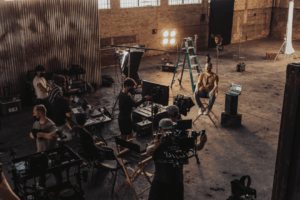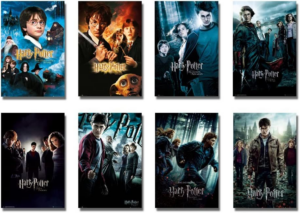A director is a key creative figure in film, theater, or television production responsible for overseeing and coordinating various aspects of a project. They guide actors, make artistic and technical decisions, and ensure the overall vision of the work is realized. Directors play a crucial role in shaping the storytelling, visuals, and performances to bring a project to life. Explore the multifaceted role of a director.

What Does a Director Do in a Film?
In a film, a director translates the script into a visual and auditory experience. They work closely with the production team to make creative decisions about camera angles, lighting, set design, and the overall look and feel of the movie. Directors also collaborate with actors to elicit the desired performances, ensuring that the characters come to life as envisioned in the script. Additionally, they oversee the editing process to shape the final narrative and pacing of the film, ultimately bringing their artistic vision to the screen.
What does a Director ACTUALLY do?
What’s a Director Good At?
Visual Storytelling
They excel at translating written scripts into compelling visual narratives making creative decisions about shot composition, framing, and camera movement to convey the story effectively.
Communication
Directors are adept at articulating their vision to the cast and crew, ensuring everyone understands the desired tone, performances, and overall project direction.
Leadership
They provide strong leadership on set, guiding actors and crew members to work cohesively and efficiently toward a common goal.
Creative Problem-Solving
Directors often encounter challenges during production and must find innovative solutions, whether related to budget constraints, technical issues, or unforeseen circumstances.
Artistic Sensibility
They possess a keen artistic sense, with a deep understanding of aesthetics, composition, and the emotional impact of visual and auditory elements.
Attention to Detail
Directors pay meticulous attention to every aspect of a production, from set design and costume choices to lighting and sound, ensuring that each element contributes to the overall storytelling.
Collaboration
They work closely with actors, cinematographers, editors, and other team members to create a cohesive and harmonious final product.
Adaptability
Directors must be flexible and open to input from others while maintaining a strong vision for the project, adjusting as needed to achieve the best results.
Time Management
Effectively managing the production schedule and staying on track is crucial for directors to ensure the project is completed on time and within budget.
Understanding of Audience
Directors consider the target audience and tailor their creative decisions to engage and resonate with viewers.
Overall, a director’s skill set combines artistic creativity with practical leadership and problem-solving abilities to bring a film or project to life.
Who Does a Director Work With?
A director works with various individuals and departments throughout the filmmaking or production process. Here are some key collaborators a director typically interacts with:
Producers
Directors collaborate with producers who oversee the logistical and financial aspects of the project. Producers help secure funding, manage budgets, and ensure the production stays on schedule.
Screenwriters
Directors often work closely with screenwriters to understand and interpret the script. They may provide input on script revisions and make creative choices to bring the written story to life.
Casting Directors
Casting directors help the director find and select actors who are well-suited for the roles in the project. The director provides input on casting decisions.
Actors
Directors guide and direct actors in their performances, helping them bring their characters to life in alignment with the director’s vision.
Cinematographers
Directors collaborate with cinematographers (also known as directors of photography) to determine the visual style of the film, including camera angles, framing, lighting, and camera movements.
Production Designers
These professionals are responsible for the visual aesthetics of the film, including set design, costumes, props, and overall production design. Directors work closely with them to achieve the desired look and feel.
Art and Costume Departments
Directors liaise with these departments to ensure that sets, costumes, and props align with the project’s artistic vision and period or theme.
Sound Department
Directors work with sound designers and engineers to create the auditory elements of the film, including dialogue, music, sound effects, and overall sound design.
Editors
Directors collaborate with film editors to shape the final narrative and pacing of the film through the editing process. They provide input on the selection of shots and sequences.
Assistant Directors
Assistant directors help with the logistical aspects of production, such as scheduling, coordinating the crew, and ensuring that the shoot stays on track.
Visual Effects and Post-Production Teams
Directors work with visual effects artists, colorists, and other post-production professionals to finalize the visual and auditory aspects of the film.
Marketing and Distribution Teams
In larger productions, directors may be involved in marketing and promotional activities to help promote the film to its target audience.
Stunt Coordinators and Choreographers
When a film includes action sequences or choreography, directors collaborate with experts in these areas to ensure safety and achieve the desired visual impact.
What is the Difference between Film Director and Producer?
A film director is primarily responsible for the creative aspects of a film’s production. They guide the artistic vision, work closely with actors to elicit performances, make decisions about cinematography and visual style, and oversee the editing process to shape the final narrative. Directors focus on the storytelling and artistic aspects of the project.
On the other hand, a film producer is responsible for the logistical and financial aspects of filmmaking. Producers secure funding, manage budgets, hire key personnel, handle contracts, and ensure the project stays on schedule. They collaborate with the director but are more concerned with the practical aspects of production, including securing resources and ensuring the film is completed within budget and on time. Producers are crucial in bringing the director’s creative vision to life by providing the necessary resources and support.
What is a Director’s Role in Pre-Production?
Script Analysis
Directors thoroughly analyze the script to understand its themes, characters, and the intended emotional impact. They make creative decisions about translating the written word into visual and auditory storytelling.
Casting
Directors work with casting directors and hold auditions to select actors who are the best fit for the project’s characters. They make final casting decisions and may conduct rehearsals, or chemistry reads to ensure the cast works well together.
Collaboration with Producers
Directors collaborate with producers to establish budgets and production schedules, ensuring their creative vision aligns with the available resources.
Design and Art Direction
Directors work closely with production designers, art directors, and costume designers to shape the visual elements of the film, including sets, costumes, props, and overall aesthetics.
Storyboarding and Shot Lists
Directors often create storyboards or shot lists that outline how they envision scenes unfolding visually. This helps in communicating their vision to the production team and ensuring consistency in the visual storytelling.
Location Scouting
Directors may participate in location scouting to find suitable places to shoot scenes, considering the script’s requirements and logistical considerations.
Crew Selection
They hire key crew members, such as cinematographers, editors, and department heads, to help execute their vision. This involves assessing their skills and compatibility with the project.
Rehearsals
Directors may conduct rehearsals with actors to help them understand their characters, relationships, and the director’s expectations for performances.
Collaboration with Department Heads
Directors communicate their creative vision to department heads, including the cinematographer, production designer, and costume designer, to ensure everyone is aligned on the project’s visual and artistic direction.
Planning and Logistics
Directors participate in pre-production meetings to discuss logistical details, such as scheduling, budgeting, and equipment needs, to ensure a smooth production process.
In essence, the director’s role in pre-production is to shape the artistic vision of the project, assemble the necessary team and resources, and establish a clear plan for bringing the script to life during the production phase. It is a critical phase that sets the tone and direction for the filmmaking process.
What Does a Director Do During Production?
During the production phase of a film or project, a director plays a hands-on and central role in overseeing the execution of their creative vision. Here’s what a director does during production:
Blocking and Staging
Directors work with actors and the cinematographer to block out and stage scenes. They determine the positioning of actors, camera angles, and movements within the frame to achieve the desired visual and emotional impact.
Directing Performances
Directors guide and coach actors to deliver performances that align with the characters and emotions outlined in the script. They provide feedback, adjust performances as needed, and ensure that the actors convey the intended depth and authenticity.
Communication
Directors maintain clear and open communication with the entire production team, providing direct feedback and addressing any questions or concerns on set.
Shot Composition
Directors work closely with the cinematographer to achieve the visual style they envision. This includes making decisions about framing, camera movement and shot sequencing to capture the scenes as they see fit.
Problem-Solving
Directors often encounter unexpected challenges during filming, such as weather issues, technical glitches, or scheduling conflicts. They must make quick decisions and find creative solutions to keep the production on track.
Time Management
Directors are responsible for adhering to the shooting schedule and ensuring that all necessary shots are captured within the allotted time frame.
Visual and Artistic Direction
Directors continue to work with the production design team to ensure that sets, costumes, and props align with the intended visual aesthetic.
Collaboration
Directors collaborate with various department heads, including the director of photography, production designer, costume designer, and more, to ensure that all elements come together cohesively.
Monitoring Continuity
Directors pay attention to continuity, ensuring that scenes match lighting, actors’ positions, props, and costumes to maintain consistency throughout the film.
Reviewing Takes
After each take, directors review the footage to assess the quality of the shot and the performance. They decide to do additional takes or move on to the next shot.
Safety
Directors prioritize the safety of the cast and crew on set, especially during scenes involving stunts or special effects.
Maintaining Vision
Directors consistently refer back to their artistic vision and make adjustments as necessary to ensure that the film aligns with their initial concept.
In essence, a director’s role during production is to bring the script to life by orchestrating the creative and technical aspects of filmmaking, working closely with the cast and crew to achieve their artistic vision while managing the practical aspects of the shoot.
What Does a Director Do During Post-Production?
During the post-production phase of filmmaking, a director continues to be actively involved in shaping the final product. Here’s what a director typically does during post-production:
Editing
Directors work closely with the film editor to review and refine the edited footage. They provide feedback on the pacing, sequencing of shots, and overall narrative flow to ensure that the film aligns with their creative vision.
Sound Design
Directors collaborate with sound designers and engineers to create the auditory elements of the film. This includes dialogue editing, adding music and sound effects, and crafting the overall sound design to enhance the storytelling.
Visual Effects (VFX)
If the film includes visual effects, directors work with VFX artists to integrate these elements seamlessly into the footage, ensuring they enhance the storytelling and visuals.
Color Grading
Directors may participate in the color grading process, where the visual look and mood of the film are fine-tuned through color correction and color grading techniques.
Music Composition
Directors provide input on the musical score, working with composers to ensure that the music enhances the emotional impact and atmosphere of the film.
Reviewing Cuts
Directors review various cuts of the film, including rough cuts and fine cuts, and provide feedback to ensure that the final edit aligns with their creative vision.
Post-Production Meetings
Directors attend post-production meetings to discuss the progress of the film’s editing, sound design, and visual effects. They collaborate with the post-production team to address any remaining issues or adjustments.
Quality Control
Directors ensure that the final product meets their artistic standards and vision, making final decisions on edits, sound, and visual effects.
Marketing and Promotion
While not always directly involved, directors may participate in promotional activities and marketing efforts to help promote the film to its target audience.
Finalizing Credits
Directors work with the post-production team to finalize the film’s credits, acknowledging the contributions of the entire crew and cast.
Screening and Testing
Directors may organize test screenings to gather audience feedback and make final adjustments based on audience reactions.
In summary, a director’s role during post-production is to oversee the editing, sound design, and visual effects processes to ensure that the final film aligns with their creative vision. They collaborate with various post-production specialists and guide them to shape the film into its final form before its release.
How to Become a Film Director?
Becoming a film director is a challenging and competitive journey that requires a combination of education, experience, networking, and a strong passion for storytelling. Here are the steps to become a film director:
Education
While formal education is not a requirement, many successful directors have bachelor’s or master’s degrees in film, cinematography, or a related field. Consider enrolling in a reputable film school or taking filmmaking courses to gain a strong foundation in the craft.
Learn the Basics
Study the fundamentals of filmmaking, including screenwriting, cinematography, editing, sound design, and production design. Understanding each aspect of the filmmaking process is crucial for effective directing.
Practice Your Craft
Start making your films. Even with limited resources, you can create short films, web series, or experimental projects to gain practical experience. Practice writing scripts, shooting scenes, and directing actors to hone your skills.
Build a Portfolio
Create a portfolio of your work. Your portfolio should showcase your best projects and demonstrate your unique style and storytelling abilities. A strong portfolio is essential for attracting potential collaborators and employers.
Networking
Networking is crucial in the film industry. Attend film festivals, workshops, and industry events to meet fellow filmmakers, actors, producers, and other professionals. Building relationships can lead to opportunities and collaborations.
Assistant Work
Consider working as a production assistant or in other entry-level roles on film sets. This will give you valuable on-set experience and a deeper understanding of film production operations.
Directing Shorts and Independent Project
Continue to direct your projects, including short films and independent features. These projects can serve as calling cards and demonstrate your ability to handle larger productions.
Pitch Your Ideas
Develop and pitch your film ideas to producers and production companies. Building a compelling pitch and a network of industry contacts can help secure project funding.
Mentorship
Seek mentorship from experienced directors or industry professionals. Learning from those who have been successful in the field can provide valuable guidance and insights.
Persistence
The path to becoming a director can be challenging and competitive. Rejection is common, but persistence and resilience are key. Keep working on your craft, learning, and seeking opportunities.
Directing Classes and Workshops
Consider taking specialized directing classes or workshops to enhance your skills and knowledge further. These can help you refine your directorial abilities.
Film Festivals and Competitions
Submit your work to film festivals and competitions. Winning awards or gaining recognition at these events can raise your profile as a director.
Keep Learning
Stay updated on industry trends and technology. Filmmaking is an evolving field, and ongoing learning is essential for staying competitive.
Benefits of Becoming a Film Director
Becoming a film director can be a rewarding and fulfilling career choice, offering several benefits:
Creative Expression
Film directors have the opportunity to bring their artistic visions to life on the big screen. They can tell compelling stories, explore complex themes, and use their creativity to engage and entertain audiences.
Impactful Storytelling
Directors have the power to influence and inspire through storytelling. They can use film to raise awareness of important social issues, challenge stereotypes, and provoke thought and discussion.
Diverse Projects
Directors can work on various projects, from feature films to documentaries, television shows, commercials, and music videos. This diversity allows them to explore various genres and styles.
Collaboration
Directing involves working closely with a talented team of professionals, including actors, cinematographers, production designers, and editors. Collaboration can lead to innovative and rewarding creative experiences.
Recognition and Awards
Successful directors often receive recognition for their work, including awards and accolades. Winning prestigious awards can enhance their reputation and open doors to more opportunities.
Financial Rewards
Established directors can earn substantial incomes, especially if their films are commercially successful. High-profile projects can lead to lucrative contracts and financial stability.
Global Impact
Film is a global medium, and directors can reach audiences worldwide. Their work can transcend cultural and linguistic boundaries, making it a powerful tool for global communication.
Influence and Legacy
Iconic directors have left a lasting legacy in the world of cinema. Their work continues to inspire future generations of filmmakers and contributes to the evolution of the art form.
Personal Fulfillment
For many directors, the satisfaction of seeing their vision come to life and connect with audiences is deeply rewarding on a personal level.
Job Variety
Directors often have the opportunity to work on a variety of projects, keeping their work fresh and exciting. They can move between different genres and storytelling modes, preventing monotony.
Creative Control
Directors have a significant degree of creative control over their projects. They make critical decisions about casting, shot composition, editing, and overall storytelling, allowing them to shape the final product according to their vision.
Intellectual Challenge
Filmmaking involves problem-solving, critical thinking, and constant learning. Directors are presented with intellectual challenges throughout the filmmaking process, which can be intellectually stimulating.
Cultural Impact
Films can potentially influence culture, societal norms, and public discourse. Directors can use their work to shed light on important issues and contribute to cultural conversations.
While the path to becoming a film director can be challenging and competitive, the rewards, both artistic and personal, can be substantial for those who are passionate about storytelling and dedicated to their craft.
Is a Film Director a Good Job?
Whether being a film director is a good job depends on one’s passion for storytelling, creative expression, and willingness to navigate a competitive and demanding industry. It offers the chance to make an impactful contribution to the world of cinema, with potential for artistic recognition and financial rewards. However, it comes with challenges such as fierce competition, financial uncertainty, long hours, and the need to balance creative vision with practical constraints. For those who are deeply committed to filmmaking and are prepared for the hurdles along the way, being a film director can be a fulfilling and rewarding career.
What is the Salary of the Film Director?
The salary of a film director varies significantly based on experience, project scope, and industry location. Entry-level directors working on independent or low-budget films may earn a few thousand to tens of thousands of dollars per project. Mid-career directors involved in television, commercials, or mid-budget films can make annual salaries ranging from $50,000 to $200,000 or more. Established, high-profile directors directing major studio films may earn several million dollars annually, with the potential for additional income through profit participation. Independent filmmakers’ earnings can be unpredictable, while location and negotiation skills also influence a director’s salary. Overall, film directors’ income spans a wide range, from modest to substantial, depending on their experience level and the success of their projects.
What are the Skills Required to Become a Director?
Becoming a successful director requires a diverse set of skills that encompass both creative and practical aspects of filmmaking. Here are the key skills required to become a director:
Storytelling
Directors need a strong understanding of narrative structure, character development, and storytelling techniques to convey their vision effectively.
Visual Creativity
The ability to think visually and translate ideas into compelling images is crucial. Directors must have an eye for composition, framing, and aesthetics.
Communication
Directors must effectively communicate their vision to the cast and crew, articulating ideas and expectations clearly.
Leadership
Strong leadership skills are essential for guiding the cast and crew, maintaining morale, and making quick decisions under pressure.
Collaboration
Directors work closely with various departments, including cinematography, production design, costume, and sound. Collaboration and teamwork are key to achieving a cohesive final product.
Cinematic Knowledge
Understanding film history, genres, and cinematic techniques is valuable for making informed creative choices.
Technical Proficiency
Directors should be familiar with filmmaking equipment, editing software, and the technical aspects of filmmaking to communicate with the crew effectively.
Adaptability
Flexibility and the ability to adapt to changing circumstances, unexpected challenges, and varying budgets are essential in the dynamic world of filmmaking.
Emotional Intelligence
Directors must connect with actors on an emotional level to draw out authentic performances and convey the intended emotions of a scene.
Problem-Solving
Directors encounter challenges during production and must find creative solutions, whether technical, logistical, or creative.
Time Management
Effective time management is crucial to staying on schedule and maximizing limited shooting time and resources.
Attention to Detail
Directors must pay meticulous attention to continuity, aesthetics, and all elements within the frame to ensure a cohesive visual and narrative experience.
Critical Thinking
Analyzing scripts, performances, and the overall project critically is vital for making necessary adjustments and improvements.
Networking
Building and maintaining relationships in the industry can open doors to opportunities and collaborations.
Patience and Resilience
The filmmaking process can be challenging and time-consuming. Directors must remain patient and resilient in the face of setbacks and obstacles.
Financial Management
Understanding the budgeting and financial aspects of filmmaking is important, especially for independent and low-budget projects.
Legal and Ethical Awareness
Directors should be aware of legal and ethical considerations in the industry, including contracts, rights, and copyright issues.
Research Skills
Depending on the project, directors may need to research to ensure accuracy and authenticity in storytelling.
Marketing and Promotion Knowledge of marketing and promotional strategies can be helpful, especially for independent filmmakers seeking to distribute and promote their work. Developing and honing these skills over time, along with gaining practical experience through hands-on projects, internships, and mentorship, is essential for aspiring directors to succeed in the competitive world of filmmaking.
Film Director and Creativity
A film director’s approach to creativity involves a multi-faceted and immersive process. They draw inspiration from diverse sources, including literature, art, personal experiences, and contemporary culture, to craft a unique vision for each project. This creative vision guides their choices in storytelling, visual aesthetics, and performances as they work collaboratively with a team to transform ideas into a cinematic reality. A director’s creativity is not only about envisioning the end product but also about adapting, problem-solving, and experimenting throughout the filmmaking journey, pushing the boundaries of storytelling and visual expression to create a compelling and impactful cinematic experience.
Top Ten Hollywood Movies that Won Oscar Award for Best Direction
Here is a list of ten notable Hollywood Films that have earned the Academy Award for Best Director:
The Shape of Water (2017) – Directed by Guillermo del Toro

A visually stunning and dynamic fantasy film that explores themes of love and acceptance.
THE SHAPE OF WATER | Official Trailer | FOX Searchlight
[Jwatchnow link=”https://www.youtube.com/watch?v=B3qktVnca1Q” watchon=”YouTube Movies”]
La La Land (2016) – Directed by Damien Chazelle

A modern-day musical set in Los Angeles, celebrating the joy and heartache of pursuing dreams.
La La Land (2016 Movie) Official Trailer – ‘Dreamers’
[Jwatchnow link=”https://www.primevideo.com/detail/0H7M04DTV2G0YOTVKSS5F7BNUP/ref=atv_sr_fle_c_Tn74RA_1_1_1?sr=1-1&pageTypeIdSource=ASIN&pageTypeId=B08MWSRPB9&qid=1698672303210″ watchon=”Prime Video”]
The Revenant (2015)- Directed by Alejandro González Iñárritu

A harrowing survival story featuring a remarkable performance by Leonardo DiCaprio in the wild American frontier.
The Revenant | Official Trailer [HD] | 20th Century FOX
[Jwatchnow link=”https://www.primevideo.com/detail/0HKCTA7FWSUKCT3OIOTLJOTGE0/ref=atv_sr_fle_c_Tn74RA_2_1_2?sr=1-2&pageTypeIdSource=ASIN&pageTypeId=B07KMVSGPN&qid=1698672254261″ watchon=”Prime Video”]
Birdman (2014) – Directed by Alejandro González Iñárritu

A dark comedy that explores fame, relevance, and artistic struggle, shot in a unique continuous-take style.
BIRDMAN – Official Worldwide Trailer
[Jwatchnow link=”https://www.primevideo.com/detail/0JKSVBD51Y4V0F99543PJ7K9D8/ref=atv_sr_fle_c_Tn74RA_1_1_1?sr=1-1&pageTypeIdSource=ASIN&pageTypeId=B07CHQJKWN&qid=1698672224075″ watchon=”Prime Video”]
Gravity (2013) – Directed by Alfonso Cuarón

A visually stunning and intense space thriller that showcases a lone astronaut’s struggle to survive.
Gravity – Official Main Trailer [2K HD]
[Jwatchnow link=”https://www.primevideo.com/detail/0O73OBAZRUHNI7790OZJ2FOS40/ref=atv_sr_fle_c_Tn74RA_1_1_1?sr=1-1&pageTypeIdSource=ASIN&pageTypeId=B086PGH18Z&qid=1698672150662″ watchon=”Prime Video”]
Life of Pi (2012) – Directed by Ang Lee

A visually mesmerizing adaptation of Yann Martel’s novel, exploring themes of faith, survival, and storytelling.
Life of Pi Official Trailer #1 (2012) Ang Lee Movie HD
[Jwatchnow link=”https://www.primevideo.com/detail/0T63NIIZ5I28VN34NDO8JW5L7N/ref=atv_sr_fle_c_Tn74RA_1_1_1?sr=1-1&pageTypeIdSource=ASIN&pageTypeId=B07R3FCQQP&qid=1698672121904″ watchon=”Prime Video”]
The Artist (2011) – Directed by Michel Hazanavicius

A silent, black-and-white film that pays homage to the early years of Hollywood and the transition to talkies.
The Artist (2011) Official Trailer – Jean Dujardin, Bérénice Bejo Movie HD
[Jwatchnow link=”https://www.hulu.com/movie/the-artist-fe6923f0-372a-4fbb-a46e-d03bfa166d5e” watchon=”Hulu”]
The King’s Speech (2010) – Directed by Tom Hooper

A compelling historical drama about King George VI’s efforts to overcome his stammer.
[Jwatchnow link=”https://www.amazon.com/Kings-Speech-Colin-Firth/dp/B004R36QUE” watchon=”Amazon”]
The Hurt Locker (2009) – Directed by Kathryn Bigelow

A gritty and intense look at the life of bomb disposal experts during the Iraq War, making Bigelow the first woman to win the Oscar for Best Director.
[Jwatchnow link=”https://www.primevideo.com/detail/0RQXLMJ8F91S1S7AUOY7MJJ0E9/ref=atv_sr_fle_c_Tn74RA_1_1_1?sr=1-1&pageTypeIdSource=ASIN&pageTypeId=B0B8NQQZBY&qid=1698671856624″ watchon=”Prime Video”]
No Country for Old Men (2007) – Directed by Joel and Ethan Coen

A suspenseful and bleak thriller in the Texas desert, blending Western and noir elements.
No Country For Old Men (2007) Official Trailer – Tommy Lee Jones, Javier Bardem Movie HD
[Jwatchnow link=”https://www.primevideo.com/detail/0QX1AKFV1AFC8QVNI2G82PXX8H/ref=atv_sr_fle_c_Tn74RA_1_1_1?sr=1-1&pageTypeIdSource=ASIN&pageTypeId=B01MCWSOMJ&qid=1698671835749″ watchon=”Prime Video”]
Videos
Film Director | What I do & how much I make | Part 1 | Khan Academy
What’s the point of a director?












